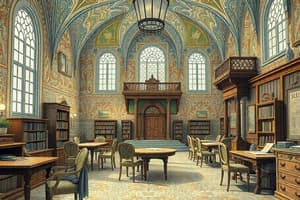Podcast
Questions and Answers
What teaching strategy involves gradually removing support structures as students gain independence?
What teaching strategy involves gradually removing support structures as students gain independence?
Which strategy is primarily focused on collaborative small group work involving higher-order thinking?
Which strategy is primarily focused on collaborative small group work involving higher-order thinking?
In which teaching strategy does the teacher verbalize their thoughts while engaging with a text?
In which teaching strategy does the teacher verbalize their thoughts while engaging with a text?
Which of the following is NOT a form of student engagement mentioned in the strategies for teaching comprehension?
Which of the following is NOT a form of student engagement mentioned in the strategies for teaching comprehension?
Signup and view all the answers
What type of learning does the term 'Independent Learning' best describe?
What type of learning does the term 'Independent Learning' best describe?
Signup and view all the answers
Which activity can be classified as a group activity aimed at enhancing reading skills?
Which activity can be classified as a group activity aimed at enhancing reading skills?
Signup and view all the answers
Which strategy focuses on having students provide personal reactions to the literature they engage with?
Which strategy focuses on having students provide personal reactions to the literature they engage with?
Signup and view all the answers
Which of the following strategies is most likely to enhance comprehension through competitive elements?
Which of the following strategies is most likely to enhance comprehension through competitive elements?
Signup and view all the answers
Which genre of children's literature is characterized by realism and involves relatable characters and situations?
Which genre of children's literature is characterized by realism and involves relatable characters and situations?
Signup and view all the answers
What is one significant characteristic of children's literature that distinguishes it from adult literature?
What is one significant characteristic of children's literature that distinguishes it from adult literature?
Signup and view all the answers
How does children's literature contribute to emotional development in learners?
How does children's literature contribute to emotional development in learners?
Signup and view all the answers
Which feature is often utilized in children's literature to aid memory and recognition?
Which feature is often utilized in children's literature to aid memory and recognition?
Signup and view all the answers
What type of literature is characterized by stories set in the past and often incorporates real historical events?
What type of literature is characterized by stories set in the past and often incorporates real historical events?
Signup and view all the answers
Which benefit of literature involves enhancing a student’s understanding and appreciation of diverse cultures?
Which benefit of literature involves enhancing a student’s understanding and appreciation of diverse cultures?
Signup and view all the answers
What final quality is often expected in children's literature regarding the story’s conclusion?
What final quality is often expected in children's literature regarding the story’s conclusion?
Signup and view all the answers
Which genre of children's literature primarily aims to inform or educate the reader about a specific subject?
Which genre of children's literature primarily aims to inform or educate the reader about a specific subject?
Signup and view all the answers
Which of the following best defines pedagogy?
Which of the following best defines pedagogy?
Signup and view all the answers
What is one of the key components of pedagogy mentioned in the content?
What is one of the key components of pedagogy mentioned in the content?
Signup and view all the answers
According to the provided content, how do Long and Rosenblatt describe the teaching of literature?
According to the provided content, how do Long and Rosenblatt describe the teaching of literature?
Signup and view all the answers
What is meant by 'a transaction with the literary text'?
What is meant by 'a transaction with the literary text'?
Signup and view all the answers
Which of the following best explains the significance of children's literature as described in the content?
Which of the following best explains the significance of children's literature as described in the content?
Signup and view all the answers
What are students encouraged to do when engaging with a literary text?
What are students encouraged to do when engaging with a literary text?
Signup and view all the answers
Which of the following is NOT identified as a key component of pedagogy?
Which of the following is NOT identified as a key component of pedagogy?
Signup and view all the answers
What outcome does nurturing a love for literature aim to develop in students?
What outcome does nurturing a love for literature aim to develop in students?
Signup and view all the answers
Study Notes
Pedagogy and Literature
- Pedagogy is the study of teaching and how this process influences and is influenced by the social, political and psychological development of learners.
- It is about the methods a teacher uses to achieve their objectives and ensure students are engaged in age-appropriate learning activities.
- The key components of pedagogy are: teaching methods, curriculum design, assessment and evaluation, classroom management, adaptation to learners, reflection and improvement, and technology integration.
Teaching Literature
- Long (1986) and Rosenblatt (1985) describe the traditional teaching of literature as dull, uninteresting, and boring.
- They believe that reading a literary work is a unique experience and requires a unique range of emotions over a particular text under a unique reading situation.
- This implies that a student's experience with literature is a "transaction with the literary text" that involves their personal interpretation and engagement with the material.
- Students should be encouraged to express their thoughts about the text and discover how it relates to them personally.
- Engaging with literature in this way nurtures continuous love, enjoyment, and appreciation for reading, and develops language proficiency and literary aptitude.
Children's Literature
- Children's literature is a product of imagination born out of how a writer interacts with children and constructs their perspective on childhood. (Otten, 2003)
- It comprises a wide variety of writing for readers from very young children to teenagers approaching adulthood. (Laffrado, 1995)
- The main genres of children's literature include Picture books, Storybooks, Traditional Literature, Historical Fiction, Modern Fantasy, Realistic Fiction, Nonfiction or Informational Books, Biography, Children’s Poetry, and Children’s Drama.
Benefits of Literature
- Literature provides learners with the chance to respond appropriately to literature and cultivate their thoughts about the subject.
- It allows students to develop an appreciation of their own culture and others.
- Literature helps students develop emotional strength, stability, steadfastness, resourcefulness, and ingenuity.
- It promotes social maturity and helps social development.
- Literature promotes and preserves people's cultural and literary heritage from generation to generation.
Children's Literature vs. Adult Literature
- Children's literature is simple, naïve, unsophisticated, natural, and uncomplicated.
- It focuses on the present and everyday problems and difficulties.
- It echoes the feelings, moods, sensitivities, and experiences of children today and expresses these from a child's perspective.
- Children's literature uses illustrations, repetition, and avoids adult themes.
- It is often action-packed and thrives on fantasy, imagination, and happy endings.
- It aims to teach a moral lesson, making it both enjoyable and educational.
Literature-Based Teaching Strategies
- Scaffold Instruction: Students are given structures that are gradually removed, allowing them to become more independent over time.
- Modeling: Teachers think aloud about their thoughts and reactions to a text while reading or discussing it.
- Cooperative Learning: Students work together in small groups on tasks that involve risks and higher-level thinking skills.
- Independent Learning: Students engage in activities that promote reading, writing, and thinking skills.
- Literary Response: Students act and create in response to what they read.
Studying That Suits You
Use AI to generate personalized quizzes and flashcards to suit your learning preferences.
Related Documents
Description
Explore key concepts in pedagogy and literature teaching methods with this quiz. Understand how pedagogy influences learning and the reading experience of literary works. Test your knowledge on effective teaching strategies and the emotional engagement with texts.



